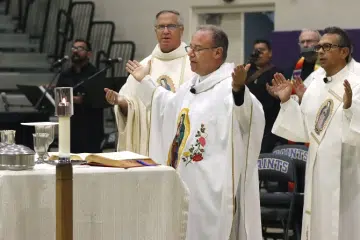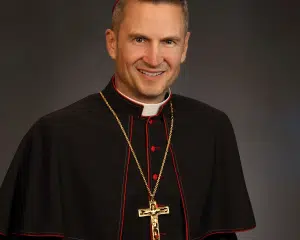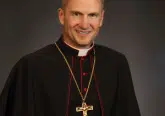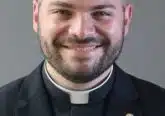CCHD fights poverty, defends human dignity
October 21,2011
By Eileen Connelly, OSU
ARCHDIOCESE — There was a time when Nathan Gordon was a young man without hope. His reality was poverty and violence on the streets of inner city Cincinnati. Angry, bitter and desperate, he made a decision that landed him in prison for felony theft at the age of 18.
Now 23 and having served his time, Gordon has found a way to turn his life around and help other young men avoid making the same mistakes he did through the HELP Program. Founded in 2007 by Marianist Brother Mike Murphy, the goal of the program is to provide services that support ex-offenders by offering mentoring and social justice advocacy, as well as job training and other resources.
HELP’s target group is young men like Gordon, explained Brother Mike, those ages 16-30 years age who are high school drop outs with felony convictions, or who have served time in prison with few options for the future. HELP aims to aid and guide these individuals out of poverty, dangerous environment and possible homelessness. It is designed to address systemic issues of chronic poverty and low educational achievements, while simultaneously addressing cycles of criminal activities and non-employment.
Brother Mike credits a grant from the Catholic Campaign for Human Development (CCHD) with enabling the program to assist young men such as Gordon with finding hope and transforming their lives. In recent months, Brother Mike said the program has helped place 15 men in jobs, and his goal is to double that number by Christmas.
“You hear a lot about violence on the street, but I see the guys who come to us hungry and thinking they don’t have any future. No one will talk to them, no one will hire them,” he said.
As the men undergo leadership training, then move into volunteer positions within the program through which they mentor others and become involved in advocacy work in the local community, a transformation occurs. “Their motivation changes,” said Brother Mike. “They see hope.”
Gordon has spent great deal of time in his old neighborhood where he talks to the young men and is “determined to show them there is another way.” He aspires to one day become a social worker and help others have the opportunity to transform their lives as he did.
“I knew Brother Mike was trusting me with a whole lot when he decided to help me and I’m going to do my part to get my life together and help other guys do the same thing,” Gordon said. “I have direction, hope and goals now and am very grateful for the blessings I’ve received.”
The HELP Program is just one example of how CCHD grants have made a difference in the archdiocese, helping the poor become self-sufficient in a variety of ways.
In Springfield, the Think Tank, an initiative of the Clark County Circles Campaign, is helping low-come individuals and families develop relationships across class lines in order to develop a plan for breaking the cycle of poverty. The families are recruited from the local community and paired with their middle and upper class counterparts in “intentional relationships,” that break down barriers and ultimately become the catalyst for transforming communities, said Karin VanZant, co-founder and CEO of the Think Tank and the national Circles Campaign.
“These are families that want to better their situation. They’ve been playing by all the rules, maybe even working two jobs to support their families, but are still struggling,” VanZant explained. “We offer a leadership program that helps identify their strengths and community resources and encourages them to find their voices as leaders as they become champions on behalf of their neighborhoods.”
Many of the middle and upper income families are recruited from area parishes and are people that want to “work on poverty issues in a real way. They are people who have been on mission trips or volunteer at their local soup kitchen,” said VanZant. “They want to be involved and make a difference.”
The families gather weekly for dinner together, followed by separate adult and children’s programs. As the children participate in age-appropriate activities, the adults engage in conversations focused on the areas of relationships, reason and resources. Racial, economic and cultural barriers are broken, relationships are formed and transformation occurs, said VanZant, who expressed her gratitude for the CCHD grant that makes the program possible. Participants begin to realize that “we all have the same problems or barriers,” she said. “It’s just the resources that are different. There is a sense of community that develops.”
That sense of community has empowered the low-income families to accomplish many things, she added, including paying off their car loans and increasing their financial literacy. And, for the families with whom they’ve developed relationships, it has led to a realization of “what’s really important to them and how they spend their time and money.”
Another program that has been supported by a CCHD grant is Families That Matter (FTM). Established by the Intercommunity Justice and Peace Center (IJPC) in 2002, FTM is a network of support for families who have or had a loved one on Ohio’s death row. FTM members and staff collaborate with attorneys to develop clemency campaigns to seek commutation or exoneration from the governor and Ohio Parole Board. They also organize for the purpose of influencing policy makers both in favor of and opposed to the death penalty, explained Congregation of Divine Providence Sister Alice Gerdeman, IJPC coordinator.
“The average family doesn’t have the skills to advocate with legislators, prepare petitions or give talks,” she explained. “We give them the tools they need to do this and help connect them with others who are facing this same kind of crisis in their lives to help make it more bearable.”
Recently, FTM worked with the family of Shawn Hawkins, who was scheduled to be executed on June 14. On June 8, Gov. John Kasich commuted Hawkins’ death sentence to life without the possibility of parole after questioning the clarity of the details of his role in a 1989 double slaying.
“His family gave talks and collected 65,000 signatures on his behalf,” said Sister Alice, “but if you ask them, they would say that we were a significant part of saving’s this man’s life.”
For more information about CCHD, visit http://www.catholiccincinnati.org/ ministries-offices/catholic-social-action/cchd.













